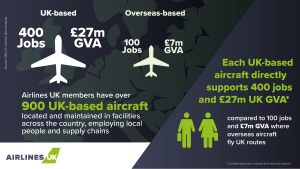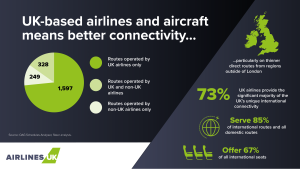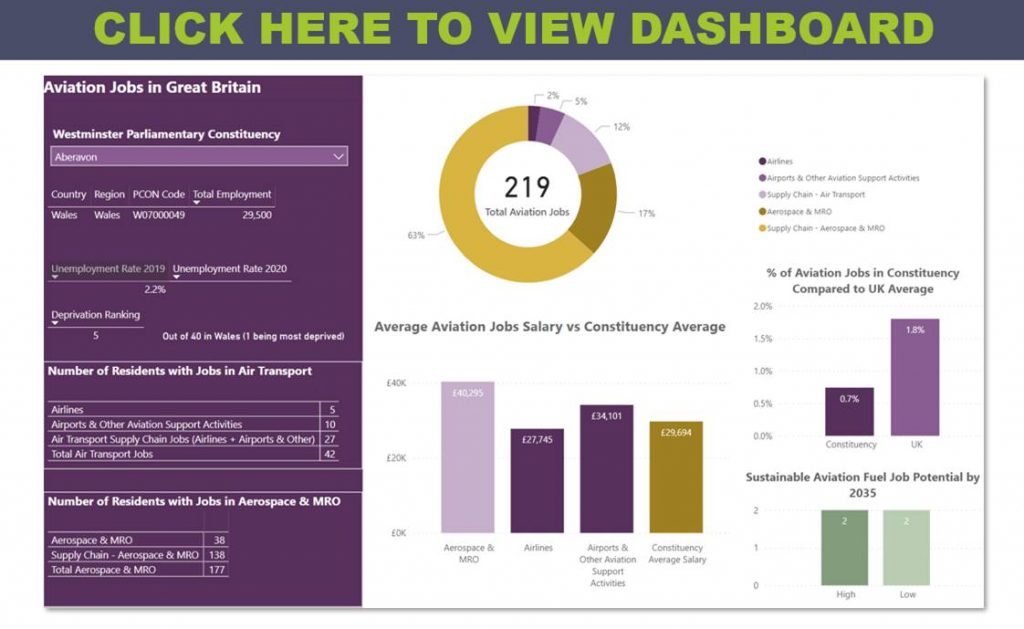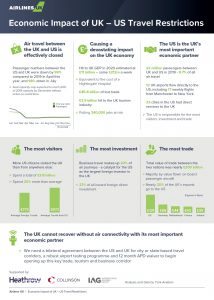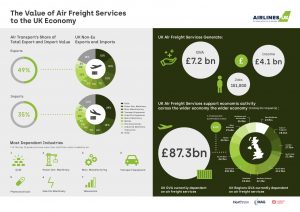£26bn cash injection for UK economy up for grabs with a reopening of international travel this summer
£26bn cash injection for UK economy up for grabs with a reopening of international travel this summer
- New report details massive opportunity for the UK economy through trade and tourism so long as current restrictions on air travel are eased this summer
- Report makes clear the urgent need for the Global Travel Taskforce to recommend a safe and sustainable resumption of international travel on 17 May
- It highlights the cost of a ‘lost summer’ of international travel – £55.7bn in lost trade and £3.0bn in tourism GDP if reopening delayed until September – putting more than half a million jobs at risk.
- Being unable to re-open to the EU would cause the most damage, followed by the United States, with no air link to the US until September costing the UK £2.4bn (£23m per day) putting 51,600 jobs at risk
- Vaccine rollout in the UK and abroad, ever-increasing testing capability and new health certification technology can allow international travel to resume in summer 2021 and avoid costing the UK £47.6bn in GDP this year (over £200m a day) removing the risk to more than a million jobs
A new report reveals the size of the opportunity for the UK economy by reopening the border with key markets including the US, by the summer.
Read the report here
The Government has established the Global Travel Taskforce to recommend to the Prime Minister ways in which international travel can reopen safely and at scale from 17 May. This new report details the catastrophic impact that only a limited reopening of travel from May, would have.
It reveals that the hit to UK GDP of delaying any restart until September would be £26.2bn, in addition to lost trade, encompassing imports and exports, of £55.7bn. Around 574,000 jobs would be at risk including 73,000 within UK tourism. The wider hit to the UK’s tourism sector would cost £3.0bn.
In contrast, enabling a safe and sustainable resumption of international travel from 17 May for the whole of the remainder of 2021 would generate a GDP injection of £47.6bn and help secure more than a million jobs otherwise under threat – worth some £200m a day to our economy. This report builds on earlier work that demonstrated that the loss of air connectivity to the UK’s largest trading partner (the US) cost the UK some £30m a day in 2020. Overall, an estimated 5,164 UK aviation and related jobs have been lost every month since February 2020, according to Unite the Union.
As the vaccine rollout accelerates both in the UK and abroad, and with widespread testing becoming ever further embedded, a phased easing of restrictions is required to help the UK’s economy recover. International travel can safely resume on 17 May, through a tiered system based on risk. The UK Government has the opportunity to set a framework to re-establish international travel, for others to follow.
The aviation industry’s focus remains on working with Ministers on such a framework for travel that is safe, robust and workable. It is critical that this can stand the test of time throughout the summer and beyond, ensuring that a stop/start approach is never seen again as the sector looks to rebuild confidence.
Tim Alderslade, Chief Executive of Airlines UK, the industry association representing UK-registered carriers, said: “For many of us, aviation is associated with a holiday or much needed break. However, this new report demonstrates just how vital the UK’s air links are to our economic prosperity, be it for British exporters, the hospitality sector or companies with an international footprint. The data refutes the claim that keeping aviation shut down, or delaying restart beyond the summer, is a price worth paying – with each day planes are grounded costing tens of millions of pounds and putting thousands of jobs at risk. The priority now is clear; ensuring a durable framework for a risk-based approach to reopening air travel from 17 May”.
Sean Doyle, British Airways CEO, said: “The emotional and economic cost of not starting to re-open international travel on May 17 is clear. With more than 50% of the UK adult population vaccinated in a programme that has been the envy of the world the Government must now urgently provide a phased, risk-based framework for travel to re-start this summer that will save the economy and jobs, allow business to re-start and reunite friends and families.”
David Evans, Joint CEO at Collinson, said: “This summer, a hybrid of testing and vaccine verification must be used to provide a safe and sustainable model to reopen travel that removes or dramatically reduces restrictions and quarantines while protecting both individuals and our economy. We are in a very different position today than we were a year ago, with an accelerated vaccine roll-out taking place and advanced testing capabilities up and down the country. Testing alone is already playing a critical role in keeping aviation moving: Collinson has safely delivered over 200,000 tests in the past half year, and we know first-hand the power of testing and of science to keep travellers safe and to provide them with peace of mind.”
Stewart Wingate, Chief Executive, Gatwick Airport, said: “The aviation sector had been hit hard by the pandemic and we cannot afford to leave it behind as the rest of society opens up, otherwise UK plc will lack the vital infrastructure, supply chains and logistics operations it needs to recover quickly through trade and all the other economic activity that airports and airlines generate.
“Public health is of course the absolute priority and – provided vaccine rollouts across Europe succeed and restrictions ease as we start the summer – a flexible risk-based approach to reopening international travel would not only help us reopen, rebuild and protect jobs, it would start to restore consumer confidence and allow people to see family or enjoy a well-deserved break”.
Heathrow CEO, John Holland-Kaye, added: “Advances in testing technology, coupled with the country’s incredible vaccination progress means a safe and irreversible resumption of international travel from May 17th is within our sights. For over a year, travel restrictions have effectively severed the UK’s ties with its key trading partners, stunting the country’s economic growth. For example, resuming transatlantic travel would add £2.4bn to the national economy this summer alone and help protect over 50,000 jobs. If this Government is serious about delivering a Global Britain, the Travel Taskforce must seize this opportunity to put in place a risk-based framework that protects public health and rebuilds vital trade links to countries like the US.”
Shai Weiss, CEO, Virgin Atlantic said: “The free movement of people and goods by air is vital for competition, connectivity and supporting the UK’s economic recovery. This report presents evidence that the resumption of international travel, specifically between lower risk countries such as the UK and US – our largest trading partner accounting for 15% of all UK trade – must remain the objective. In 2019, Transatlantic connectivity underpinned trade worth $273bn. As an essential driver of global trade, FDI and our hospitality and tourism sectors, a thriving and competitive aviation market is more important than ever to the future success of Global Britain.
“A phased easing of testing requirements and border restrictions, that follows the scientific evidence, will protect public health and ensure that skies can safely reopen from 17th May, safeguarding half a million UK jobs reliant on the sector.”
Read the report here
Infographic summary here


